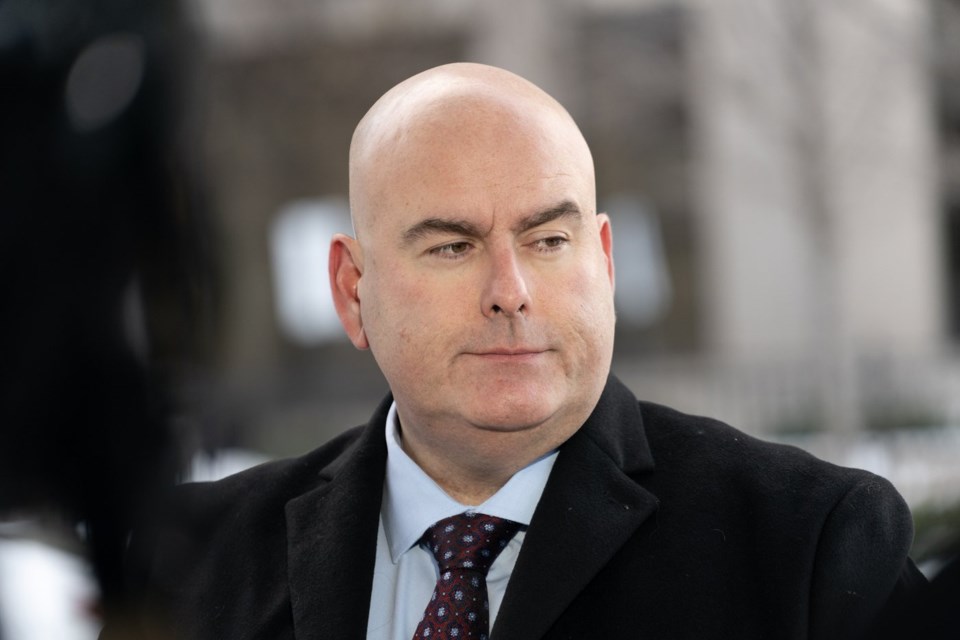As Brampton, Ont., deals with the fallout of two days of violent protests outside a Hindu temple, other Ontario cities are also considering enacting local laws that would ban protests near institutions such as places of worship and schools.
But one academic who specializes in freedom of expression warns such a move could curtail people's right to express their views.
Brampton Mayor Patrick Brown has said he plans to ask city council to consider a bylaw that would ban protests at places of worship after violence erupted as hundreds of demonstrators gathered Sunday outside the Hindu Sabha Mandir, which led to the arrest of three people.
That demonstration, initiated by Sikh separatists who seek an independent nation called Khalistan, spurred a counter-protest at the temple on Monday night, where police allege some in the crowd were carrying weapons and throwing objects.
Brown said on social media Sunday that he has asked Brampton’s city solicitor to look at the legality of such a bylaw. He didn't respond to a request for a phone interview this week.
In the neighbouring municipality of Vaughan, Ont., city council unanimously approved a bylaw in June to prohibit "organizing or participating in a nuisance demonstration" within 100 metres of "vulnerable social infrastructure" such as places of worship, schools, child-care centres or hospitals.
The city says the bylaw is "not intended to prohibit peaceful gatherings, protests or demonstrations," including those that are part of a labour union strike.
Vaughan Mayor Steven Del Duca said council approved the bylaw after “large scale and very disturbing” protests in the city that took place near synagogues earlier this year. He said he believes Vaughan became one of the first municipalities in Canada to enact such a law.
“If somebody wants to peacefully protest and not engage in behaviour that's intimidating or intolerant or inciting hatred, and they want to do that relatively close, for example, to a daycare, I don't think the bylaw would necessarily actually be triggered,” Del Duca said in a phone interview.
But James Turk, director of the Centre for Free Expression at Toronto Metropolitan University, said there’s “no need” for such bylaws when it’s already illegal to incite violence or engage in it across Canada.
It’s unclear what municipal bylaws like Vaughan’s can change or add, he said.
“Virtually every kind of behaviour that they rightly would like to prevent is already illegal,” Turk said. “People have a right to safety, and if there’s a threat of violence or a likelihood of violence, we already have laws that protect against that.”
Del Duca said Vaughan hasn’t had any large-scale demonstrations since the motion was passed, but he said he couldn’t directly link that to the bylaw, which he hopes he never has to use.
“(I’m) a very strong supporter of the right to protest,” he said. “But when the line is crossed ... I do believe that action needs to be taken.”
Last week, Ottawa city council voted to study the feasibility of a similar bylaw, with plans for staff to report their findings by early next year.
Ottawa Coun. Allan Hubley, who moved the motion, said escalating tensions during some demonstrations in the city prompted him and other councillors to consider taking legislative action that would protect vulnerable institutions without restricting the right to protest.
In a phone interview, Hubley pointed to a local Jewish community space where protesters had gathered last September, which was near a Jewish long-term care home.
The Jewish Federation of Ottawa later said that police were deployed to the site as there had been multiple confrontations involving “aggressive protesters.”
Hubley also pointed to last year's demonstrations outside some public schools that targeted gender identity and gender expression rights in the classroom.
“That was very intimidating and scary for the kids that were there. It ended up having a protest on both sides of the issue there,” Hubley said. “As long as you’re going to be peaceful, you’ll get a permit. You can have your protest, but stay away from the school.”
If more Ontario cities are considering enacting bylaws like Vaughan’s, they must consider Charter rights, Turk said, adding that such moves could deter people from demonstrating lawfully.
“The only effect of what they're doing would be to further restrict speech by those who are protesting, as well as to chill others who may want to protest," he said.
Hubley said he hopes a bylaw would ultimately make residents feel safer, while promoting peaceful protesting in Ottawa.
“We’re not putting up with any hate or threats of violence, that stuff has to stop. We can also escalate.”
This report by The Canadian Press was first published Nov. 6, 2024.
Rianna Lim, The Canadian Press


